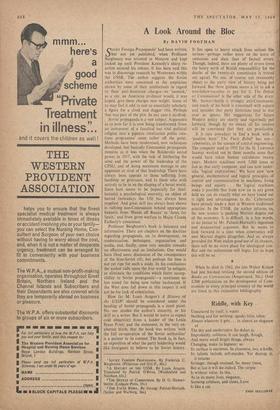A Look Around the Bloc
By DAVID FOOTMAN
Soviet Foreign Propaganda' had been written, but not yet published, when Professor Barghoorn was arrested in Moscow and kept
locked up until President Kennedy's sharp re- action secured his release. It has been said this was to discourage research by Westerners within the USSR. The author suggests the Soviet authorities were concerned at the scepticism shown by some of their intellectuals in regard to their anti-American charges—to 'unmask,' as a spy, an American professor would, it was hoped, give these charges new weight. Some of us may feel it odd to cast so essentially scholarly a figure for a cloak and dagger role. Perhaps that was part of, the plot. In any case it misfired.
Soviet propaganda is a vast subject. Arguments as to how far it is now being transformed 'from an instrument of a fanatical but vital political religion into a gigantic totalitarian public rela- tions programme' seem rather off the point. Methods have been modernised, new techniques developed, but basically Communist propaganda remains as it was when the Bolsheviks seized power in 1917, with the task of furthering the aims and the power of the leadership of the CPSU, and of doing maximum damage to any opponent or rival of that leadership. There have always been appeals to those suffering from hardship or grievance, and to those who wish actively to be in on the shaping of a better world. Since hate seems to be (especially for intel- lectuals) a psychological necessity, an object of hatred (nowadays the US) has always been supplied. And great skill has always been shown in rallying non-Communists behind appropriate banners, from 'Hands off Russia' to 'Arms for Spain,' and from germ warfare to Major Claude Eatherly's conscience.
Professor Barghoorn's book is balanced and informative. There are chapters on the doctrine regarding propaganda, on its development, on modernisation, techniques, organisation and media, and, finally, some very sensible remarks on effectiveness and on limitations. One would have liked some discussion of the consequences of the Sino-Soviet rift; but perhaps the time is not yet ripe for such a study. In his conclusions the author calls upon the free world 'to mitigate or eliminate the conditions which foster suscep- tibility to Soviet propaganda'—a sentiment no less sound for being now rather hackneyed. If the West does fall down in this respect it will not be for lack of exhortation.
How far M. Louis Aragon's A History of the USSR' should be considered under the heading of Soviet propaganda is a moot point. No one doubts the author's sincerity, or his skill as a writer. But it would be naive to expect cold objectivity from a holder of the Lenin Peace Prize; and the statement, in the very ex- uberant blurb, that the book was written 'with the full co-operation of the Soviet authorities' is a pointer to its content. The book is, in fact, an exposition of what the party leadership would like foreigners to believe to be Soviet history.
SOVIET FOREIGN PROPAGANDA. By Frederick C. Bargboorn. (Princeton and O.U.P., 48s.)
A HISTORY OF THE USSR, By Louis Aragon. Translated by Patrick O'Brian. (Weidenfeld and Nicolson, 63s.)
Tun DEFEAT OF COMMUNISM. By D. G. Stewart- SMITH. (Ludgate Press, 35s.)
'Tun FACTS REBEL. By George Patoczi-Horvath. (Seeker and Warburg, 36s)
It lies open to heavy attack from .serious his- torians—perhaps rather more on the score of omissions and slant than of factual errors. Though, indeed, there are plenty of errors (even the hoary myth of British responsibility for the deaths of the twenty-six commissars is trotted out again). No one, of course, can reasonably object to the party view of history being put forward. But three guineas seems a lot to ask a non-fellow-traveller to pay for it. The Defeat of Cominunisni3 is the other side of the story. Mr. Stewart-Smith is strongly anti-Communist, and much of his book is concerned with aspects and episodes that party historians tend to slur over or ignore. His suggestions for future Western policy are clearly and vigorously put forward, though by no means all his readers will be • convinced that they are practicable.
It is rare nowadays to find a book with a 'positive hero.' The Facts Rebel' has one— cybernetics, or the science of control engineering. The computer used in 1951 for the St. Lawrence Seaway worked out in three months sums that would have taken human calculators twenty years. Modern machines work 5,000 times as fast as that early computer, and can now under- take 'logical explorations.' We have now 'new .general, mathematical and logical principles of control and communication in machines, living beings and society . . . the logical machines make it possible that from now on in any given field we can do exactly what we have found out is right and advantageous to do.' Cybernetics have already made a dent in Western traditional practice. In the USSR, the author informs us, the new science is pushing Marxist dogma out of the economy. It is difficult, in a few words, to do justice to Mr. Paloczi-Horvath's ingenious and documented argument. But he seems to look forward to a time when cybernetics will oust Marxist dogma altogether. And so, always provided the West makes good use of its chances, there will be no more place for ideological con- flict and the millennium will begin. Let us hope this will be so.
When he died in 1962, the late Walter Kolarz had just finished revising the second edition of Books on Communism (Ampersand, 30s.). Over 2,500 publications on the development of Com- munism in every principal country of the world are listed in this exhaustive bibliography.






























 Previous page
Previous page